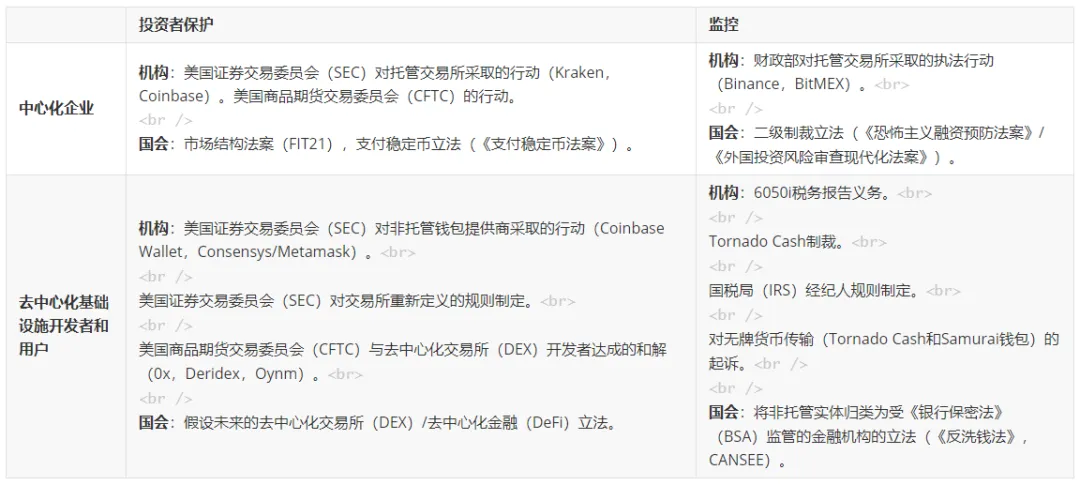Translated by | GaryMa Wu Blockchain
Original link:
Followin' the recent elections, Crypto has received significant attention, with many speculating on the new administration and Congress' attitude towards Crypto. In short, we expect some policy improvements in certain areas, while other areas still face challenges. We believe that in the securities and banking regulatory space, there may be more clarity on rules, such as those targeting centralized secondary markets and centralized stablecoin issuers.
However, the prospects are less clear when it comes to anti-money laundering, tax reporting, and sanctions. Below are our thoughts on these issues and our preliminary analysis of future opportunities and challenges.
How to View Crypto-Related Issues During the Transition of Power
Crypto policy issues can be broadly divided into two categories: regulatory issues (tax reporting, BSA/AML, sanctions) and investor protection issues (SEC, CFTC, banking). Achieving good policy in one category does not necessarily mean the same success in the other. The underlying motivations behind these two policy areas differ (protecting investors vs. identifying and stopping illicit fund flows), and the political motivations and coalition-building opportunities for lawmakers also differ in each domain.
Similarly, the Crypto ecosystem can be divided into two broad categories: centralized businesses (custodial wallet providers, centralized exchanges, trusted issuers) and decentralized infrastructure developers and users (protocol developers, non-custodial wallets and app developers, and the non-intermediated users of these protocols and apps).
Coin Center aims to advocate for good policy across all dimensions, but our core mission is to defend the rights of decentralized and peer-to-peer tool developers and users. In the investor protection or regulatory domains, any overly aggressive regulatory regime could threaten developers and users. However, the threats from the regulatory domain have appeared more far-reaching in recent years.
The following chart depicts past and potential future policy actions to help you understand this framework:

You may notice that the bottom-right box appears particularly heavy compared to the others. This may reflect our focus. Coin Center's mission centers on defending the code publication rights of decentralized infrastructure developers (implicating the First Amendment) and opposing unreasonable regulatory requirements (implicating the Fourth Amendment). This box is precisely where these two issues intersect. While there is some bias, this area has indeed been the most contentious over the past four years. There are multiple explanations for this, such as from a public and news cycle perspective, some politicians have mistakenly or opportunistically linked global and foreign policy tragedies to Crypto (e.g., Hamas fundraising, Russian oligarchs attempting to evade sanctions). Additionally, in building political coalitions, the left and right, though rarely aligned, have sometimes found common ground on national security and regulatory issues.
What are the biggest threats?
Over the past few years, the freedoms of individual Crypto users and developers have faced serious threats. We have seen the SEC become increasingly over-enforcement, with their exchange definition rule revisions gradually encroaching on individual developers and users, as well as their enforcement actions against wallet providers like ConsenSys' Metamask and Coinbase Wallet. Meanwhile, regulatory issues have also become increasingly prominent, including 6050I reporting obligations, the Tornado Cash sanctions, broker reporting requirements, and prosecutions of non-custodial developers for unlicensed money transmission. Concurrently, in Congress, we have been fighting against legislation like CANSEE and DAMLA, which seek to impose unreasonable regulatory obligations on non-custodial developers.
The Tough Nuts to Crack
Three major threats require special attention: (1) 6050I, (2) the Tornado Cash sanctions, and (3) the prosecutions for unlicensed money transmission. First, in the 6050I context, we have ongoing litigation where we believe the IRS's requirement to compel the disclosure of personal information of recipients of over $10,000 in Crypto violates the Constitution's protections against warrantless information disclosure. Second, on the Tornado Cash sanctions, we likewise have ongoing litigation arguing that the sanctions law did not empower the Treasury Department to prohibit Americans from using an immutable smart contract (which is neither a foreign person nor their property). Third, we are appalled by the Southern District of New York's prosecutions of the developers of non-custodial software tools like Tornado Cash and Samurai Wallet for unlicensed money transmission, and will support the defendants in these cases as much as possible. While the DOJ may change under the new administration, given its political independence, it may not abandon these prosecutions due to a change in government.
Reasons for Optimism
While not delving deeply, the claim that the new administration will be more friendly towards centralized domestic businesses, particularly on investor protection-related issues, appears credible. This is good news, as intermediated services and efficient capital formation are crucial to expanding Crypto's appeal, especially for less tech-savvy audiences. However, how about Coin Center's core focus, the impact on truly decentralized tool and service developers and users?
From an institutional perspective, President Trump's generally supportive stance on Crypto and his choices for SEC and Treasury appointments may mean that some controversial rulemaking will be frozen or even reversed. This is a consistent positive signal for us, as the SEC's exchange redefinition rules and the IRS's broker rules for non-custodial developers have always been hanging swords.
Whether the new administration will scale back overly aggressive sanctions and anti-money laundering policies remains uncertain. Nevertheless, we hope that if it becomes clear that even under a more Crypto-friendly SEC, harsh regulatory policies will drive innovators out of the US, stifle development, and deprive ordinary Americans of the benefits of this technology, some progress may be made. These policies have minimal actual effect in stopping criminals and terrorists.
We are also optimistic that Congress may play a larger role in pushing these regulatory issues. Substantial work has already been done, including legislators sending critical letters on 6050I implementation, the Tornado Cash sanctions, and the prosecutions for unlicensed money transmission. Bills like the Blockchain Regulatory Certainty Act will provide legislative solutions to address the unlicensed money transmission prosecutions, and we are prepared to find bipartisan paths for their passage.
We look forward to collaborating with the new administration on this issue and are cautiously optimistic that if our arguments are compelling enough, they will receive fair consideration. In the arc of history, America's constitutional rights, particularly the respect for free speech and the vigilance against warrantless searches and seizures, should make this the best place to build and use Crypto and open blockchain networks. What needs to be clear is that "supporting Crypto" means not just choosing more Crypto-friendly institutional leaders or implementing more business-friendly regulations, but also defending some deeply rooted aspects of American culture: the defense of privacy and free speech, even in the most difficult times when national security concerns and the shadows of crime and terrorism briefly obscure our enduring pursuit of liberty, privacy, and openness. Now is the time to take action, to secure strong legal precedents that protect these technologies and enshrine their potential benefits in the nation's future.








